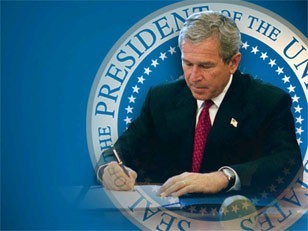He also called on the Democratic-run Congress to follow his example and lift a ban on offshore drilling to help increase domestic oil production.
"I readily concede it won't produce a barrel of oil tomorrow, but it will reverse the psychology," Bush told a White House news conference - his first since late April.
Bush said the two troubled mortgage companies play a central role in the nation's housing-finance system and that government action to help them were not bailouts because the two would remain shareholder-owned companies.
"I don't think the government ought to be involved in bailing out companies," Bush said.
Amid soaring gas prices, the toughest real estate market in decades, falling home prices and financing that's harder to come by, Bush said: "It's been a difficult time for many American families." But he also said that the nation's economy continues to grow, if slowly.
Bush said that despite the woes of Fannie Mae and Freddie Mac and the recent government takeover of California bank IndyMac, U.S. depositors should not worry because their deposits are insured by the government up to $100,000
"If you're a depositor, you're protected by the federal government," Bush said.
The administration and the Federal Reserve announced an emergency rescue plan Sunday to bolster Fannie Mae and Freddie Mac, which hold or guarantee more than $5 trillion in mortgages - almost half of the nation's total.
The plan would temporarily increase a long-standing Treasury line of credit that could be provided to either company. Treasury also said it would, if necessary, buy stock in the companies to make sure they have enough money to operate.
The Fed also announced that it would allow Fannie and Freddie to get loans directly from the Fed - a privilege previously granted only to commercial banks until this March, when the Fed extended the borrowing to investment banks to deal with the collapse of Bear Stearns.
At the same time, a housing package was heading toward final congressional passage. It would modernize the Federal Housing Administration and create a new regulator and tighter controls for Fannie Mae and Freddie Mac.
It's this legislation that Bush urged Congress to pass as soon as possible.
Congress could move as early as this week on the housing legislation to send it to Bush. First, though, House and Senate leaders must strike a deal in consultation with Treasury Secretary Henry Paulson to resolve key differences so Bush, who has threatened to veto the measure, will sign it.
"I think the system is basically sound, I truly do," Bush said. "I understand there's a lot of nervousness. The economy is growing. Productivity is high. Trade's up. People are working - it's not as good as we'd like. And to the extent that we'll find weakness, we'll move."
Bush defended his insistence that the U.S. economy was not in a recession, even though many economists believe it is.
He said the traditional definition of a recession - two quarters in a row of negative growth - had not been met.
"I'm not an economist, but I do believe we're growing," he said. "I'm an optimist. I believe there's a lot of positive things for the economy."
He acknowledged, however, that "it's not growing as it should."
On Capitol Hill, Fed Chairman Ben Bernanke warned that inflation seemed likely to move even higher and economic growth would be "appreciably below its trend rate,"
"In general, healthy economic growth depends on well-functioning financial markets," Bernanke said. "Consequently, helping the financial markets to return to more normal functioning will continue to be a top priority," he said.
Bush acknowledged it could take years before opening the Continental Shelf to oil drilling would result in increased U.S. production. But, he said, at least it would put the nation on the right track toward reducing its reliance on imported oil.
"There is no short term solution," Bush said. "The president doesn't have a magic wand. You can't just say, 'Low gas.' "
Asked about his comment earlier this year that he hadn't heard of $4 gasoline, Bush said: "I've heard of it now."
Asked why he hasn't appealed more to Americans to conserve energy, Bush said: "They're smart enough to figure out whether they're going to drive less or not ... The marketplace works."
"If they're not in their homes, they ought not to keep the air conditioning running. There's a lot they can do," he added.
Bush's first full-blown exchange with reporters at the White House since April 29 came amid troubling developments in Afghanistan, where U.S. deaths have exceeded casualties in Iraq over the last two months. There also is turmoil in the financial markets, and the government has been forced to throw a lifeline to mortgage giants Fannie Mae and Freddie Mac.
Bush opened with a statement about steps to help stabilize the housing and financial markets and his lifting of the executive ban on offshore oil drilling. He also called on lawmakers to pass long-stalled spending bills.
On other subjects, Bush:
- Said the wars in Iraq and Afghanistan are both important fronts on the war on terrorism. Currently, events in Iraq are going better, and some troops are coming home "based upon success," he said. "The question really facing the country is, will we have the patience and determination to succeed in these very difficult theaters."
- Declined to comment on whether he felt betrayed by a highly critical book about his administration by former press secretary Scott McClellan.
- Expressed unhappiness with the casting of vetoes by Russia and China in the U.N. Security Council to block U.S.-sponsored sanctions on the government of President Robert Mugabe of Zimbabwe, who was has retained power in an election that the United States and many other countries have labeled a sham. "I was displeased," Bush acknowledged.

http://accesswdun.com/article/2008/7/211551
